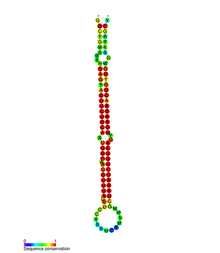mir-22
| mir-22 | |
|---|---|
 | |
| miR-22 microRNA secondary structure and sequence conservation | |
| Identifiers | |
| Symbol | mir-22 |
| Rfam | RF00653 |
| miRBase family | MIPF0000053 |
| Entrez | 407004 |
| HUGO | 31599 |
| OMIM | 612077 |
| Other data | |
| RNA type | microRNA |
| Domain(s) | Eukaryota; Euteleostomi |
In molecular biology mir-22 microRNA is a short RNA molecule. MicroRNAs are an abundant class of molecules, approximately 22 nucleotides in length, which can post-transcriptionally regulate gene expression by binding to the 3’ UTR of mRNAs expressed in a cell.
Origins
Mir-22 was originally identified in HeLa cells (an immortal cell line derived from cervical cancer cells), but was later found to be ubiquitously expressed in various tissues.[1] The gene encoding miR-22 is found on the short arm of chromosome 17, in a minimal loss of heterozygosity region. It is highly conserved across many vertebrate species, including chimp, mouse, rat, dog and horse. This level of conservation suggests functional importance. MiR-22 was previously identified as having a role in erythrocyte maturation.[2]
Role in cancer
The deregulation of many miRNAs has been shown to have a role in oncogenesis. Mir-22 was found to be over-expressed in prostate cancer but down-regulated in breast cancer, cholangiocarcinoma, multiple myeloma and hepatocellular carcinoma.[3]
Targets
Specifically, miR-22 can function as a tumour suppressor. One known target is histone deacetylase 4 (HDAC4), which is known to have a critical role in cancer development. Mir-22 also targets Myc Binding Protein (MYCBP).[4] This prevents transcription of c-Myc target genes by silencing c-MYCBP. However, c-Myc also inhibits expression of miR-22 in a positive feedback loop. When this spirals out of control, it can cause uncontrolled cell proliferation.[5]
Possible therapy
Expression of miR-22 can be induced by adding 12-O-Tetradecanoylphorbol-13-acetate (TPA) to HL-60 cells (leukaemia cell line).[6] The enforced expression causes the growth of cancer cells to slow down. This means that miR-22 could be a potential target for cancer therapies.
See also
References
- ↑ Xiong J, Yu D, Wei N, Fu H, Cai T, Huang Y, Wu C, Zheng X, Du Q, Lin D, Liang Z (2010). "An estrogen receptor alpha suppressor, microRNA-22, is downregulated in estrogen receptor alpha-positive human breast cancer cell lines and clinical samples.". FEBS J 277 (7): 1684–94. doi:10.1111/j.1742-4658.2010.07594.x. PMID 20180843.
- ↑ Choong ML, Yang HH, McNiece I (April 2007). "MicroRNA expression profiling during human cord blood-derived CD34 cell erythropoiesis". Exp. Hematol. 35 (4): 551–64. doi:10.1016/j.exphem.2006.12.002. PMID 17379065.
- ↑ Zhang J, Yang Y, Yang T, Liu Y, Li A, Fu S, Wu M, Pan Z, Zhou W (2010). "microRNA-22, downregulated in hepatocellular carcinoma and correlated with prognosis, suppresses cell proliferation and tumourigenicity". Br J Cancer 103 (8): 1215–20. doi:10.1038/sj.bjc.6605895. PMC 2967065. PMID 20842113.
- ↑ Xiong J, Du Q, Liang Z (2010). "Tumor-suppressive microRNA-22 inhibits the transcription of E-box-containing c-Myc target genes by silencing c-Myc binding protein". Oncogene 29 (35): 4980–8. doi:10.1038/onc.2010.241. PMID 20562918.
- ↑ Cole MD, McMahon SB (May 1999). "The Myc oncoprotein: a critical evaluation of transactivation and target gene regulation". Oncogene 18 (19): 2916–24. doi:10.1038/sj.onc.1202748. PMID 10378688.
- ↑ Ting Y, Medina DJ, Strair RK, Schaar DG (2010). "Differentiation-associated miR-22 represses Max expression and inhibits cell cycle progression". Biochem Biophys Res Commun 394 (3): 606–11. doi:10.1016/j.bbrc.2010.03.030. PMID 20214878.
Further reading
- ↑ Li J, Liang S, Yu H, Zhang J, Ma D, Lu X (2010). "An inhibitory effect of miR-22 on cell migration and invasion in ovarian cancer". Gynecol Oncol 119 (3): 543–8. doi:10.1016/j.ygyno.2010.08.034. PMID 20869762.
- ↑ Bar N, Dikstein R (2010). Ulrich, Henning, ed. "miR-22 forms a regulatory loop in PTEN/AKT pathway and modulates signaling kinetics". PLoS ONE 5 (5): e10859. doi:10.1371/journal.pone.0010859. PMC 2877705. PMID 20523723.
- ↑ Liu L, Jiang Y, Zhang H, Greenlee AR, Yu R, Yang Q (2010). "miR-22 functions as a micro-oncogene in transformed human bronchial epithelial cells induced by anti-benzo[a]pyrene-7,8-diol-9,10-epoxide". Toxicol in Vitro 24 (4): 1168–75. doi:10.1016/j.tiv.2010.02.016. PMID 20170724.
- ↑ Pandey DP, Picard D (2009). "miR-22 inhibits estrogen signaling by directly targeting the estrogen receptor alpha mRNA". Mol Cell Biol 29 (13): 3783–90. doi:10.1128/MCB.01875-08. PMC 2698751. PMID 19414598.
External links
| ||||||||||||||||||